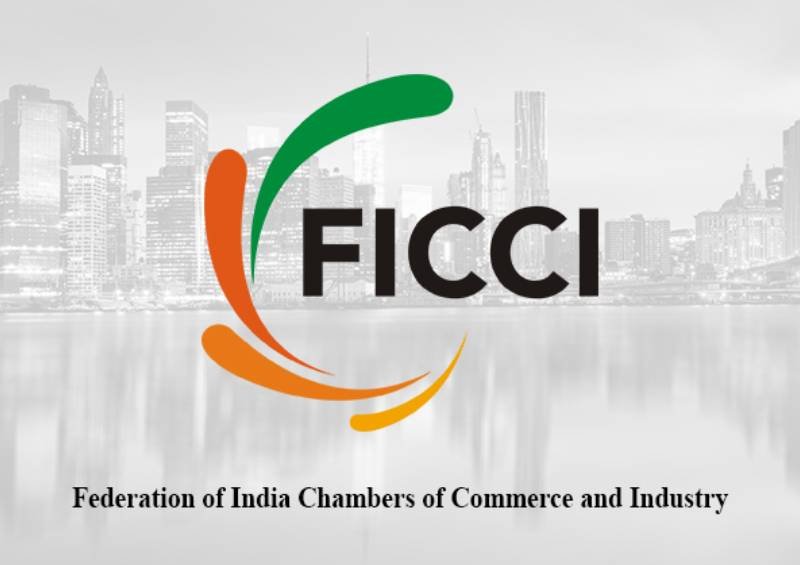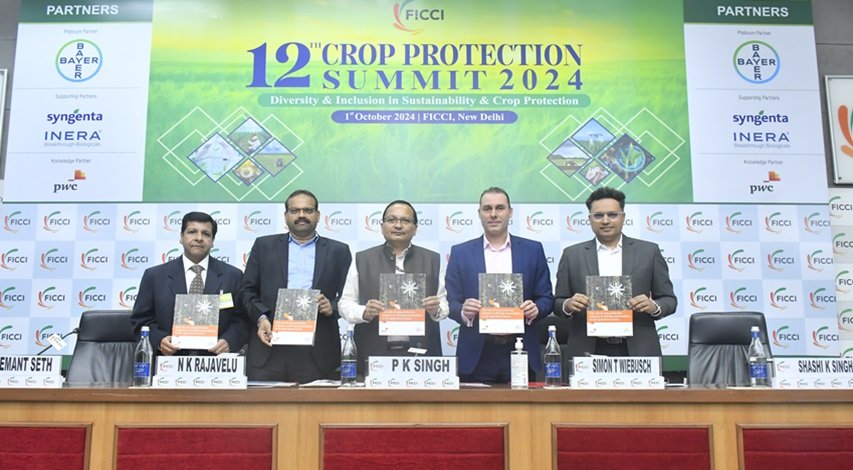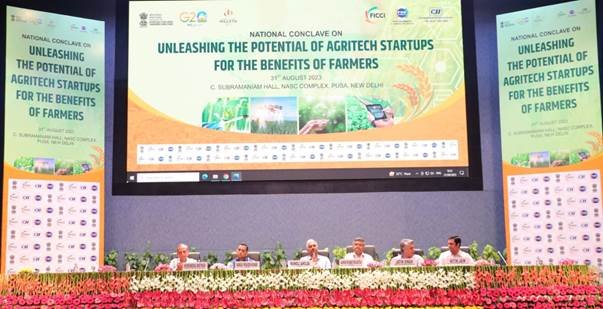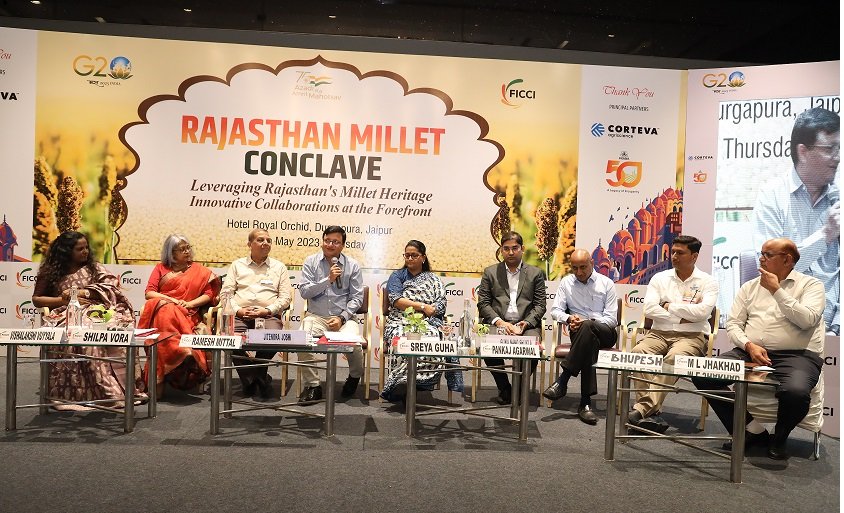Agricultural sector, including allied activities, expected to grow at 3.6% in 2024-25: FICCI
The latest round of FICCI’s Economic Outlook Survey projects an annual median GDP growth forecast of 6.4 per cent for 2024-25. The forecast in the current survey marks a moderation from 7.0 per cent estimate (for 2024-25) put out in the previous round conducted during the month of September last year. The numbers are in line with the broad expectations and reflect a notable slowdown vis-à-vis 8.2 per cent GDP growth recorded in 2023-24
The agricultural sector, including allied activities, is expected to grow at 3.6 per cent in 2024-25. The industry and services sectors, on the other hand, are projected to expand by 6.3 per cent and 7.3 per cent, respectively, in 2024-25. Economic activity is expected to witness an uptick in the second half of current fiscal supported by a revival in public capital expenditure, festive demand and normalization in industrial activity post monsoon.
The present round of FICCI’s The agricultural sector, including allied activities, is expected to grow at 3.6 per cent in 2024-25. The industry and services sectors, on the other hand, are projected to expand by 6.3 per cent and 7.3 per cent, respectively, in 2024-25. Economic activity is expected to witness an uptick in the second half of current fiscal supported by a revival in public capital expenditure, festive demand and normalization in industrial activity post monsoon.
The present round of FICCI’s Economic Outlook Survey was conducted in the month of December 2024 and drew responses from leading economists representing industry, banking and financial services sector. CPI based inflation has a median forecast of 4.8 per cent for 2024-25. This is in line with the RBI’s projection in the latest monetary policy announcement in December 2024. Economists were also invited to share their perspectives on key topical issues. Despite persisting uncertainties, the global economy has exhibited resilience, though growth prospects remain uneven across regions. Monetary policy normalization continues to influence strategies in advanced economies, while the pace of disinflation varies significantly across countries.
The participating economists observed global economy in 2025 to present a reasonable growth trajectory, with an underlying note of caution. Softening price levels and ensuing monetary policy easing in some of the major economies, positive momentum in interest sensitive sectors, and continued recovery in services sectors are expected to bode well for the growth prospects this year. Furthermore, according to the survey participants the advancements in technology, particularly in semiconductors, electronics, and artificial intelligence, alongside increased attention towards green energy transitions, are expected to catalyse investments.
Nonetheless, substantial risks continue to cloud the global economic landscape. Rising geopolitical tensions and trade policy uncertainty pose as challenges, with the potential to fragment global trade and restrain growth. The impact of change in political leadership in the United States is yet to be seen.
Also, though inflation has softened across advanced and emerging market economies, however, the progress continues to vary across countries. The conflict in the Middle East remains escalated and could impact energy markets.
Additionally, elevated public debt levels are a challenge and could pose a threat to fiscal sustainability. Climate-induced disruptions are increasingly impacting economies that are heavily dependent on agriculture and commodities.
Furthermore, according to the participants, India’s economic outlook for 2025 presents cautious optimism, amidst the backdrop of persisting external headwinds.
Consumer spending is expected to gain momentum, driven by an improved outlook for the agriculture sector, which is likely to bolster rural consumption and sentiment in the first half of the next fiscal year. Food inflation – which has remained elevated for over a year and strained household budgets – is expected to ease. Furthermore, monetary easing by the Reserve Bank of India (RBI), resulting in lower interest rates, could also provide an additional impetus to consumption.
On the investment front, the government’s focus on capital expenditure is expected to remain a key growth driver in the year 2025-26. Investments in infrastructure and allied sectors—such as roads, housing, logistics, and railways—are anticipated to further economic momentum.
Nonetheless, downside risks remain on horizon. Participating economists expect the private capital expenditure cycle to stay subdued, with a cautious outlook limiting large-scale capacity additions. Factors such as geopolitical uncertainties, uneven domestic demand, oversupply from China have kept investors on the edge. However, with deleveraged corporate balance sheets, capacity utilization rates holding up, and uptick in demand – the momentum in private investments could build.
Next, the participating economists were invited to share their perspective on the expected impact of Trump’s policies on the Indian economy. The respondents indicated possibility of short-term disruptions through channels like exports, foreign capital flows, and input costs for the US trading partners including India.
The likelihood of tax cuts (personal and business) could inflate the US fiscal deficit, while higher tariffs and stricter immigration norms could push up labour costs and inflation. The Federal Reserve, in response, could cut the policy rates by less than what was anticipated. This may reduce capital inflows into emerging markets, including India, causing Rupee fluctuations.
Trade tensions, including a potential US-China trade conflict, could disrupt supply chains and raise input costs in the short term. However, economists expect US to take a calibrated approach towards India. The participating economists pointed out that new avenues could arise for Indian industries, particularly in electronics manufacturing segment, benefiting from supply chain shifts. India’s pharmaceutical industry, a global leader in generics and active pharmaceutical ingredients (APIs) are well-positioned to capitalize on supply chain shifts. India is poised to benefit from global supply chain diversification away from China. Its strategic position as a manufacturing hub could attract foreign direct investment in sectors like semiconductors, electronics, and automotive components. Targeted industrial policies and sector-specific strategies will remain critical to seizing these opportunities.
To address risks and unlock opportunities, economists recommended that India should evaluate reducing tariffs on select and specific US imports while ensuring revenue stability and minimal domestic impact. Diversifying export markets and leveraging ongoing trade negotiations will be critical to enhancing trade resilience. Also, development of high-quality industrial clusters with robust backward and forward linkages is essential for India to integrate into diversifying global supply chains. Deepening collaborations in areas like artificial intelligence, clean energy, and cybersecurity will further strengthen economic and strategic ties between India and the U.S.
The Union Budget for 2025-26, set to be presented on 1st February 2025, arrives amidst global economic uncertainties and moderating domestic growth. Against this backdrop, participating economists shared their expectations that could shape the government’s policy in the upcoming budget.
Reviving private consumption emerged as a key priority. A review of the current tax structure including rates (both direct and indirect taxes) in the Union Budget 2025-26 is called for with a view to enhance disposable income and stimulate consumer spending. Additionally, continued investments in welfare programs such as MGNREGA, PMGSY, and PMAY were recommended. Further, the participating economists expect continued capex expansion, given its strong multiplier effects. An increase between 10-15 per cent in capex over 2024-25 is being looked at in the upcoming budget.
Economists also recommended initiatives to increase agri productivity, improve rural infrastructure, and strengthen agricultural value chains. Investments in cold storage facilities and supply chain efficiency were underscored as critical to managing inflationary pressures and minimizing food wastage. A continued focus on manufacturing sector was emphasized on. With regard to improving ease and cost of doing business, the reforms pertaining to land, labour and financial sector are imperative. While many of these reforms fall in the state and concurrent domains, a resolute and actionable plan needs to be worked out. Moreover, policy certainty and timely impact assessment of regulations remains crucial. Amidst external headwinds, India’s exports prospects have come under the lens. Extending support to exporters by continuing the interest equalisation scheme was reiterated. Also, expansion in marketing support allocations was called for. was conducted in the month of December 2024 and drew responses from leading economists representing industry, banking and financial services sector. CPI based inflation has a median forecast of 4.8 per cent for 2024-25. This is in line with the RBI’s projection in the latest monetary policy announcement in December 2024. Economists were also invited to share their perspectives on key topical issues. Despite persisting uncertainties, the global economy has exhibited resilience, though growth prospects remain uneven across regions. Monetary policy normalization continues to influence strategies in advanced economies, while the pace of disinflation varies significantly across countries. The participating economists observed global economy in 2025 to present a reasonable growth trajectory, with an underlying note of caution. Softening price levels and ensuing monetary policy easing in some of the major economies, positive momentum in interest sensitive sectors, and continued recovery in services sectors are expected to bode well for the growth prospects this year. Furthermore, according to the survey participants the advancements in technology, particularly in semiconductors, electronics, and artificial intelligence, alongside increased attention towards green energy transitions, are expected to catalyze investments.
Nonetheless, substantial risks continue to cloud the global economic landscape. Rising geopolitical tensions and trade policy uncertainty pose as challenges, with the potential to fragment global trade and restrain growth. The impact of change in political leadership in the United States is yet to be seen. Also, though inflation has softened across advanced and emerging market economies, however, the progress continues to vary across countries. The conflict in the Middle East remains escalated and could impact energy markets.
Additionally, elevated public debt levels are a challenge and could pose a threat to fiscal sustainability. Climate-induced disruptions are increasingly impacting economies that are heavily dependent on agriculture and commodities. Furthermore, according to the participants, India’s economic outlook for 2025 presents cautious optimism, amidst the backdrop of persisting external headwinds. Consumer spending is expected to gain momentum, driven by an improved outlook for the agriculture sector, which is likely to bolster rural consumption and sentiment in the first half of the next fiscal year. Food inflation – which has remained elevated for over a year and strained household budgets – is expected to ease. Furthermore, monetary easing by the Reserve Bank of India (RBI), resulting in lower interest rates, could also provide an additional impetus to consumption.
On the investment front, the government’s focus on capital expenditure is expected to remain a key growth driver in the year 2025-26. Investments in infrastructure and allied sectors—such as roads, housing, logistics, and railways—are anticipated to further economic momentum. Nonetheless, downside risks remain on horizon. Participating economists expect the private capital expenditure cycle to stay subdued, with a cautious outlook limiting large-scale capacity additions. Factors such as geopolitical uncertainties, uneven domestic demand, oversupply from China have kept investors on the edge. However, with deleveraged corporate balance sheets, capacity utilization rates holding up, and uptick in demand – the momentum in private investments could build.
Next, the participating economists were invited to share their perspective on the expected impact of Trump’s policies on the Indian economy. The respondents indicated possibility of short-term disruptions through channels like exports, foreign capital flows, and input costs for the US trading partners including India. The likelihood of tax cuts (personal and business) could inflate the US fiscal deficit, while higher tariffs and stricter immigration norms could push up labour costs and inflation. The Federal Reserve, in response, could cut the policy rates by less than what was anticipated. This may reduce capital inflows into emerging markets, including India, causing Rupee fluctuations.
Trade tensions, including a potential US-China trade conflict, could disrupt supply chains and raise input costs in the short term. However, economists expect US to take a calibrated approach towards India. The participating economists pointed out that new avenues could arise for Indian industries, particularly in electronics manufacturing segment, benefiting from supply chain shifts. India’s pharmaceutical industry, a global leader in generics and active pharmaceutical ingredients (APIs) are well-positioned to capitalize on supply chain shifts. India is poised to benefit from global supply chain diversification away from China. Its strategic position as a manufacturing hub could attract foreign direct investment in sectors like semiconductors, electronics, and automotive components. Targeted industrial policies and sector-specific strategies will remain critical to seizing these opportunities.
To address risks and unlock opportunities, economists recommended that India should evaluate reducing tariffs on select and specific US imports while ensuring revenue stability and minimal domestic impact. Diversifying export markets and leveraging ongoing trade negotiations will be critical to enhancing trade resilience. Also, development of high-quality industrial clusters with robust backward and forward linkages is essential for India to integrate into diversifying global supply chains. Deepening collaborations in areas like artificial intelligence, clean energy, and cybersecurity will further strengthen economic and strategic ties between India and the U.S.
The Union Budget for 2025-26, set to be presented on 1st February 2025, arrives amidst global economic uncertainties and moderating domestic growth. Against this backdrop, participating economists shared their expectations that could shape the government’s policy in the upcoming budget. Reviving private consumption emerged as a key priority. A review of the current tax structure including rates (both direct and indirect taxes) in the Union Budget 2025-26 is called for with a view to enhance disposable income and stimulate consumer spending. Additionally, continued investments in welfare programs such as MGNREGA, PMGSY, and PMAY were recommended. Further, the participating economists expect continued capex expansion, given its strong multiplier effects. An increase between 10-15 per cent in capex over 2024-25 is being looked at in the upcoming budget.
Economists also recommended initiatives to increase agri productivity, improve rural infrastructure, and strengthen agricultural value chains. Investments in cold storage facilities and supply chain efficiency were underscored as critical to managing inflationary pressures and minimizing food wastage. A continued focus on manufacturing sector was emphasized on. With regard to improving ease and cost of doing business, the reforms pertaining to land, labour and financial sector are imperative. While many of these reforms fall in the state and concurrent domains, a resolute and actionable plan needs to be worked out. Moreover, policy certainty and timely impact assessment of regulations remains crucial. Amidst external headwinds, India’s exports prospects have come under the lens. Extending support to exporters by continuing the interest equalization scheme was reiterated. Also, expansion in marketing support allocations was called for.
The latest round of FICCI’s Economic Outlook














